B.B. King died at the age of 89
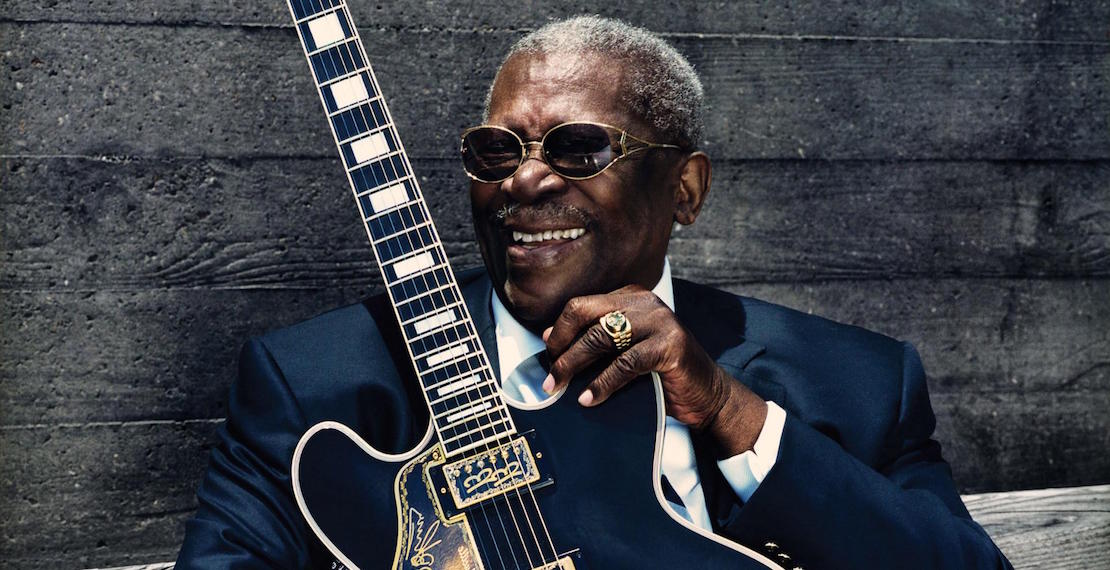
BB King – Lucille (full album)
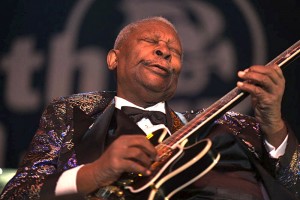 King at the North Sea Jazz Festival in Rotterdam, 2009
King at the North Sea Jazz Festival in Rotterdam, 2009
Riley B. King (September 16, 1925 – May 14, 2015), known by his stage name B.B. King, was an American blues singer, songwriter and guitarist.
Rolling Stone ranked King number 6 on its 2011 list of the 100 greatest guitarists of all time (previously ranked number 3 in the 2003 edition of the same list). He was ranked No. 17 in Gibson’s “Top 50 Guitarists of All Time.” According to Edward M. Komara, King “introduced a sophisticated style of soloing based on fluid string bending and shimmering vibrato that would influence virtually every electric blues guitarist that followed.” King was inducted into the Rock and Roll Hall of Fame in 1987. He is considered one of the most influential blues musicians of all time, earning the nickname “The King of the Blues,” and one of the “Three Kings of the Blues Guitar” (along with Albert King and Freddie King). King was also known for performing tirelessly throughout his musical career, appearing at more than 200 concerts per year on average into his 70s. In 1956, he reportedly appeared at 342 shows.
In 1990, King was awarded the National Medal of Arts by President George H.W. Bush. In 2006, he received the Presidential Medal of Freedom from President George W. Bush. He is widely regarded as one of the most influential blues guitarists of all time, inspiring countless other electric blues and blues rock guitarists.
Biography – Early Life
Riley B. King was born on September 16, 1925, on a cotton plantation called Berclair, near the town of Itta Bena, Mississippi, the son of sharecroppers Albert and Nora Ella King. He considered the nearby city of Indianola, Mississippi to be his home. When Riley was 4 years old, his mother left his father for another man, so the boy was raised by his maternal grandmother, Elnora Farr, in Kilmichael, Mississippi.
While young, King sang in the gospel choir at Elkhorn Baptist Church in Kilmichael. It seems that at the age of 12 he purchased his first guitar for $15.00, although another source indicates he was given his first guitar by Bukka White, his mother’s first cousin (King’s grandmother and White’s mother were sisters). In 1943, King left Kilmichael to work as a tractor driver and play guitar with the Famous St. John’s Quartet of Inverness, Mississippi, performing at area churches and on WGRM in Greenwood, Mississippi.
In 1946, King followed Bukka White to Memphis, Tennessee. White took him in for the next ten months. However, King returned to Mississippi shortly afterward, where he decided to prepare himself better for the next visit, and returned to West Memphis, Arkansas, two years later in 1948. He performed on Sonny Boy Williamson’s radio program on KWEM in West Memphis, where he began to develop an audience. King’s appearances led to steady engagements at the Sixteenth Avenue Grill in West Memphis and later to a ten-minute spot on the Memphis radio station WDIA. The radio spot became so popular that it was expanded and became the Sepia Swing Club.
Initially he worked at WDIA as a singer and disc jockey, gaining the nickname “Beale Street Blues Boy,” which was later shortened to “Blues Boy” and finally to B.B. It was there that he first met T-Bone Walker. King said, “Once I’d heard him for the first time, I knew I’d have to have [an electric guitar] myself. ‘Had’ to have one, short of stealing!”
Career – 1949–2005
In 1949, King began recording songs under contract with Los Angeles-based RPM Records. Many of King’s early recordings were produced by Sam Phillips, who later founded Sun Records. Before his RPM contract, King had debuted on Bullet Records by issuing the single “Miss Martha King” (1949), which did not chart well. “My very first recordings in 1949 were for a company out of Nashville called Bullet, the Bullet Record Transcription company,” King recalled. “I had horns that very first session. I had Phineas Newborn on piano; his father played drums, and his brother, Calvin, played guitar with me. I had Tuff Green on bass, Ben Branch on tenor sax, his brother, Thomas Branch, on trumpet, and a lady trombone player. The Newborn family were the house band at the famous Plantation Inn in West Memphis.”
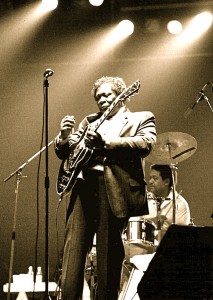 Performing with his famous guitar, Lucille
Performing with his famous guitar, Lucille
King assembled his own band; the B.B. King Review, under the leadership of Millard Lee. The band initially consisted of Calvin Owens and Kenneth Sands (trumpet), Lawrence Burdin (alto saxophone), George Coleman (tenor saxophone), Floyd Newman (baritone saxophone), Millard Lee (piano), George Joyner (bass) and Earl Forest and Ted Curry (drums). Onzie Horne was a trained musician elicited as an arranger to assist King with his compositions. By his own admission, King could not play chords well and always relied on improvisation.
King’s recording contract was followed by tours across the United States, with performances in major theaters in cities such as Washington, D.C., Chicago, Los Angeles, Detroit, and St. Louis, as well as numerous gigs in small clubs and juke joints of the southern United States. During one show in Twist, Arkansas, a brawl broke out between two men and caused a fire. He evacuated along with the rest of the crowd but went back to retrieve his guitar. He said he later found out that the two men, who died in the blaze, were fighting over a woman named Lucille. He named the guitar Lucille as a reminder not to fight over women or run into any more burning buildings.
Following his first Billboard Rhythm and Blues charts number one, “3 O’Clock Blues” (February 1952), B.B. King became one of the most important names in R&B music in the 1950s, amassing an impressive list of hits including “You Know I Love You,” “Woke Up This Morning” “Please Love Me”, “When My Heart Beats like a Hammer,” “Whole Lotta Love,” “You Upset Me Baby,” “Every Day I Have the Blues,” “Sneakin’ Around,” “Ten Long Years,” “Bad Luck,” “Sweet Little Angel,” “On My Word of Honor,” and “Please Accept My Love.” This led to a significant increase in his weekly earnings, from about $85 to $2,500, with appearances at major venues such as the Howard Theater in Washington and the Apollo in New York, as well as touring the entire “Chitlin’ circuit.” 1956 became a record-breaking year, with 342 concerts booked and three recording sessions. That same year he founded his own record label, Blues Boys Kingdom, with headquarters at Beale Street in Memphis. There, among other projects, he produced artists such as Millard Lee and Levi Seabury. In 1962, King signed to ABC-Paramount Records, which was later absorbed into MCA Records, and which itself was later absorbed into Geffen Records. In November 1964, King recorded the Live at the Regal album at the Regal Theater in Chicago, Illinois.
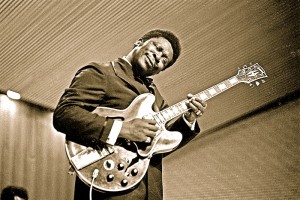 B.B. King performs in Germany in 1971.
B.B. King performs in Germany in 1971.
King gained further visibility among rock audiences as an opening act on the Rolling Stones’ 1969 American Tour. He won a 1970 Grammy Award for the song “The Thrill Is Gone;” his version became a hit on both the pop and R&B charts. It also gained the number 183 spot in Rolling Stone magazine’s 500 Greatest Songs of All Time.
King was inducted into the Blues Hall of Fame in 1980, the Rock and Roll Hall of Fame in 1987, and the Official Rhythm & Blues Music Hall of Fame in 2014. In 2004, he was awarded the international Polar Music Prize, given to artists “in recognition of exceptional achievements in the creation and advancement of music.”
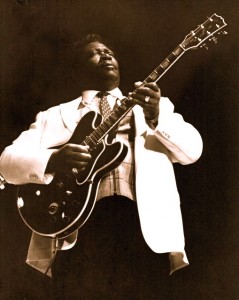 King performing in New York in the late 1980’s
King performing in New York in the late 1980’s
From the 1980s to his death in 2015, he maintained a highly visible and active career, appearing on numerous television shows and performing 300 nights a year. In 1988, King reached a new generation of fans with the single “When Love Comes to Town”, a collaborative effort between King and the Irish band U2 on their Rattle and Hum album. In December 1997, he performed in the Vatican’s fifth annual Christmas concert and presented his trademark guitar “Lucille” to Pope John Paul II. In 1998, he appeared in The Blues Brothers 2000, playing the part of the lead singer of the Louisiana Gator Boys, along with Eric Clapton, Dr. John, Koko Taylor and Bo Diddley. In 2000, he and Clapton teamed up again to record Riding With the King, which won a Grammy Award for Best Traditional Blues Album.
2006–2015: Farewell Tour and Later Activities
In 2006, King went on a “farewell” world tour, although he remained active afterward during the last years of his life. The tour was partly supported by Northern Irish guitarist Gary Moore, with whom King had previously toured and recorded, including the song “Since I Met You Baby”. It started in the United Kingdom, and continued with performances in the Montreux Jazz Festival and in Zürich at the Blues at Sunset. During his show in Montreux at the Stravinski Hall he jammed with Joe Sample, Randy Crawford, David Sanborn, Gladys Knight, Leela James, Andre Beeka, Earl Thomas, Stanley Clarke, John McLaughlin, Barbara Hendricks and George Duke.
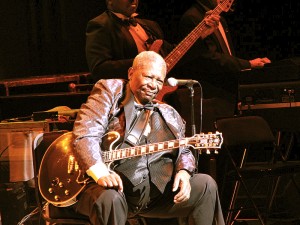 B.B. King at Roy Thomson Hall, Toronto, Ontario, May 2007
B.B. King at Roy Thomson Hall, Toronto, Ontario, May 2007
In June 2006, King was present at a memorial of his first radio broadcast at the Three Deuces Building in Greenwood, Mississippi, where an official marker of the Mississippi Blues Trail was erected. The same month, a groundbreaking was held for a new museum, dedicated to King. in Indianola, Mississippi. The B.B. King Museum and Delta Interpretive Center opened on September 13, 2008.
In late October 2006, King recorded a concert album and video entitled B.B. King: Live at his B.B. King Blues Clubs in Nashville and Memphis. The four-night production featured his regular B.B. King Blues Band and captured his show as he performed it nightly around the world. Released in 2008, it was his first live performance recording in over a decade.
In 2007, King played at Eric Clapton’s second Crossroads Guitar Festival and contributed the songs “Goin’ Home,” to Goin’ Home: A Tribute to Fats Domino (with Ivan Neville’s DumpstaPhunk) and “One Shoe Blues” to Sandra Boynton’s children’s album Blue Moo, accompanied by a pair of sock puppets in a music video for the song.
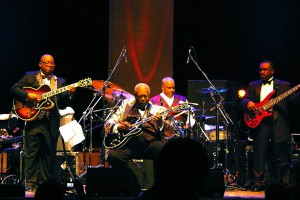 European Tour 2009, Vienna, July 2009
European Tour 2009, Vienna, July 2009
In the summer of 2008, King played at the Bonnaroo Music and Arts Festival in Manchester, Tennessee, where he was given a key to the city. Also in 2008, he was inducted into the Hollywood Bowl Hall of Fame.
King performed at the Mawazine festival in Rabat, Morocco, on May 27, 2010. In June 2010, King performed at the Crossroads Guitar Festival with Robert Cray, Jimmie Vaughan, and Eric Clapton. He also contributed to Cyndi Lauper’s album Memphis Blues, which was released on June 22, 2010.
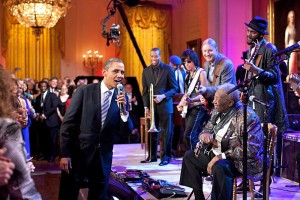 President Barack Obama and B.B. King singing “Sweet Home Chicago” on February 21, 2012
President Barack Obama and B.B. King singing “Sweet Home Chicago” on February 21, 2012
In 2011, King played at the Glastonbury Music Festival, and in the Royal Albert Hall in London, where he recorded a concert video. On February 21, 2012, King was among the performers of “In Performance at the White House: Red, White and Blues,” during which President Barack Obama sang part of “Sweet Home Chicago.” King recorded for the debut album of rapper and producer Big K.R.I.T., who also hails from Mississippi. On July 5, 2012, King performed a concert at the Byblos International Festival in Lebanon.
On May 26, 2013, King appeared at the New Orleans Jazz Festival.
On October 3, 2014, not feeling well enough, King had to stop his live performance at the House of Blues in Chicago, Illinois. A doctor diagnosed King with dehydration and exhaustion, and the eight remaining shows of his ongoing tour had to be cancelled. King didn’t schedule any additional shows for the remainder of the year.
Illness and Death
After the cancellation of the remaining eight shows of his 2014 tour because of health problems, King announced on October 8, 2014, he was back at home to recuperate. On May 1, 2015, after two hospitalizations caused by complications from high blood pressure and diabetes, King announced on his website that he was in hospice care at his home in Las Vegas, Nevada. He died on May 14, 2015 from a series of small strokes caused by Type 2 diabetes.

